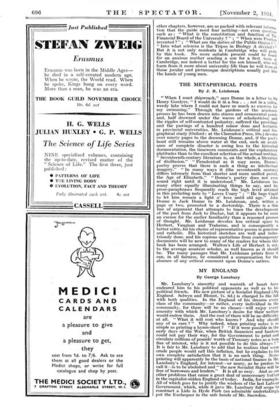Mr. Lansbury's sincerity and warmth of heart have endeared him
to his political opponents as well as to his political friends. His new picture of a Socialist England (My England. Selwyn and Blount, 7s. fid.) is charged to the full with both qualities. In the England of his dreams every class of the community—or rather, every individual in the community, for there will be no classes—will enjoy every amenity with which Mr. Lansbury's desire for their welfare would endow them. And the cost of them will be no difficulty at all. " What it will cost who knows ? And why should any of us care ? " Why indeed, when printing notes is as simple as printing a hymn-sheet ? " If it were possible in the early days of the War, when British financiers and bankers could not pay their way, for the Government to print and circulate millions of pounds' worth of Treasury notes as a loan free of interest, why is it not possible to do this always ? " It is fair to Mr. Lansbury to add that he realizes that some crude people would call this .inflation, but he explains to his own complete satisfaction that it is no such thing. Note- printing will apparently be the basis of national finance in Mr. Lansbury's England, for interest—or usury, as he prefers to call it—is to be abolished and " the new Socialist State will be free of borrowers and lenders." It is all so easy. And so are other problems that cause a great deal of unnecessary tother in the capitalist-ridden England of today. India, for example. All of which goes far to justify the wisdom of the last Labour Government, which, while it gave Mr. Lansbury full scope to construct a Lido in Hyde Park (an admirable undertaking), put the Exchequer in the safe hands of Mr. Snowden.














































 Previous page
Previous page